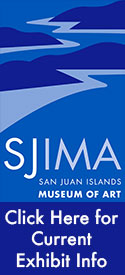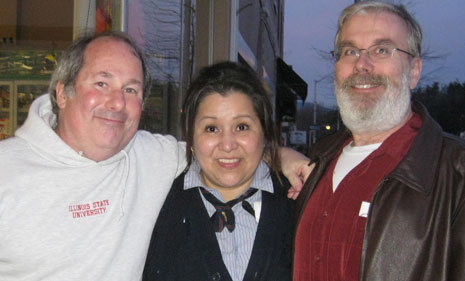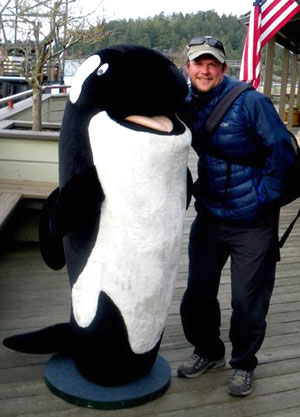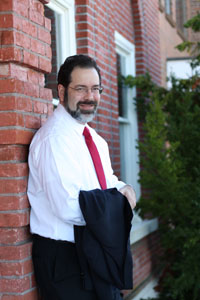Jenny Atkinson is the director of the Whale Museum, and she files this update to Jeanne’s report from yesterday:
Beginning at 7 p.m. on April 7, hydrophones operated by The Whale Museum and Beam Reach Marine Science and Sustainability School started picking up unusual sounds. Hydrophones off the coastline of Lime Kiln State Park and another node about 4 km north recorded SONAR pings and what sounded like garbled human speech. These sounds became alternately louder and softer in one or the other of the two hydrophone receiving locations. Recordings of SONAR and other sounds continued until Wednesday, April 8, 3 a.m. PST. The sounds from these hydrophones stream live via the internet on the public-accessible site www.orcasound.net. Samples of the recorded sounds are archived there.
Examination of the recorded sounds shows that the sound levels at the southern location, Lime Kiln Lighthouse, were usually higher than at the more northern location off the west-side of San Juan Island.
It is likely that the sound source was generally south of San Juan Island. Dr. Val Veirs, president of the The Whale Museum’s Board and professor of Physics (emeritus) at Colorado College, stated that “The received levels of the signals at Lime Kiln Lighthouse were about the most intense sounds that the hydrophones there have recorded in the past several years of continuous operation.”
The highest received levels came from SONAR pings. The highest received levels were approximately 140 dB re 1 microPascal. This is approximately the same as the most intense SONAR signals recorded in May 2003 when the US Navy Guided Missile “Shoup” transited the waters of Haro Strait (here’s the report). The base frequency of the SONAR pings was about 3 kHz which suggests that the SONAR is the Navy’s mid-frequency sonar which was implicated in the death of multiple beaked whales in the Bahamas October 2003.
Dr. Veirs said that “We have been told that the US Navy reported that a submarine, the USS San Francisco, was operating in the Strait of Juan de Fuca at the time that we made our observations and that the ‘garbled voices’ we heard were used for communication between the submarine and a surface tender. We estimate that the distance between our hydrophone at Lime Kiln Lighthouse and the submarine was in the neighborhood of 10 nautical miles and for our hydrophones to pick up the strong signals that they did, the submarine was emitting sound with source level in the range 175 dB to 225 dB re 1 microPa@1m.”
These sounds were heard for many miles in a variety of underwater locations from the east at Whidby Island, to the north of San Juan Island and out toward the ocean in the Strait of Juan de Fuca. The Whale Museum has not received reports of stranded or injured marine animals. If you see an injured or stranded marine mammal, please contact the San Juan County Marine Mammal Stranding Network (800-562-8832).
















